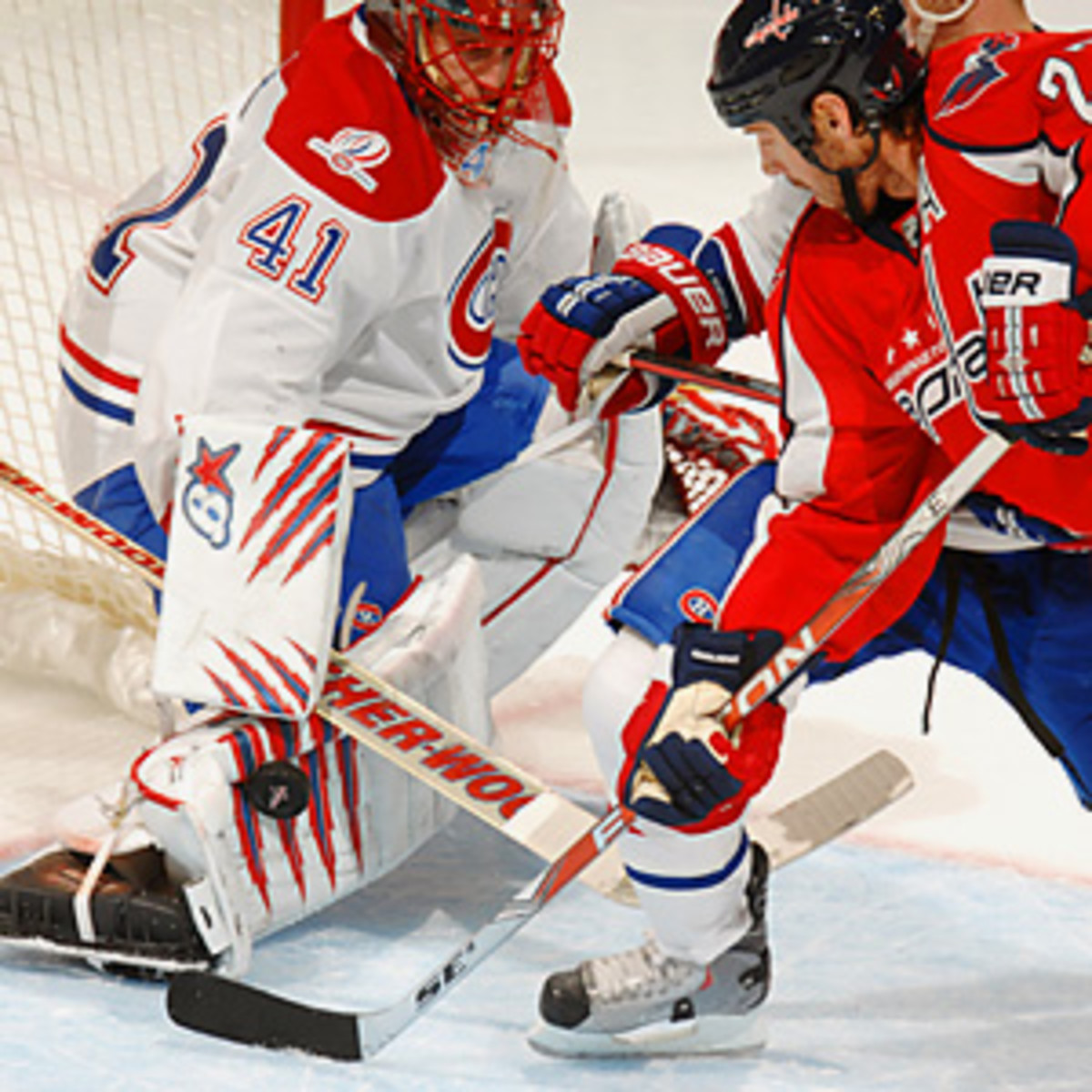Too much Halak and a power-play outage sent the Capitals packing
How, you ask, did the Capitals lose this one? How did the Presidents' Trophy winner, the first team to earn a playoff spot this season, fall to a lowly eighth seed? How did the Caps give up a 3-1 series lead? How couldn't the league's most dynamic offense score more despite outshooting their opponent by almost 100 shots (292 to 194)?
Of course, the simple answer goes by the name of Jaroslav Halak, the Canadiens' 24-year-old netminder, whose spectacular back-to-back-to-back performances stole the spotlight from Washington's sublime forwards, including its captain Alex Ovechkin, and downright robbed the series out from under them with the 2-1 Game 7 win Wednesday night.
It wasn't easy, but Halak sure made it look that way, didn't he? After a dazzling Game 6, in which he made 53 saves and pushed the Capitals to a decisive do-or-die match, the goalie who had no playoff wins on his résumé two weeks ago punched a ticket to the second round in perhaps the most stunning upset since the L.A. Kings knocked off the Edmonton Oilers in 1982. With the help of a stalwart defense that blocked almost as many shots as they let through on Wednesday night, Halak earned some serious cred around the league, and made those rumors about his possible trade out of Montreal back in December and January just seem silly.
About as silly as those words Ovechkin served up after Game 2, when the Capitals scored six goals on 37 shots in an exciting 6-5 OT win. "I watched the replay when [Eric Fehr] scored the goal and [Halak's] arm was shaking when he drink water," Ovechkin said. "So he's nervous. He knows the pressure on him, and it's a good sign for us." It turns out that Halak can shake off a couple bad outings as well as a little smack-talking.
"Our goaltender was really outstanding in the end, and probably made the difference," Montreal coach Jacques Martin said after Wednesday's game.
While Halak's performance made the upset possible, it was the team around him that made it happen. Clearing pucks around the crease, skillfully blocking shots with pressure instead of blinding screens, the Canadiens offered more evidence to support the old sports adage, "Offense wins games; defense wins championships."
That's what Blue Jackets forward R.J. Umberger was alluding to when he called the Capitals out for their go-go style, saying, "They play the wrong way. They want to be moving all the time. They float around in their zone, looking for breakaways and odd-man rushes. ... A good defensive team is going to beat them (in the playoffs). If you eliminate your turnovers and keep them off the power play, they're going to get frustrated because they're in their zone a lot." Umberger's got a future in coaching -- or clairvoyance.
But there is that part about the power play. The Capitals' unit, once an unstoppable force that scored at a 25.4 percent clip during in the regular season, was absolutely abysmal, going 1-for-33 against the Canadiens this series. That's a 3.0 percent success rate, and that's legitimately the worst playoff power play percentage for any team with at least 30 man-advantage looks. So while Washington will bemoan the iffy goalie interference call on Ovechkin's waved-off goal in the first minute of the third period, they can't deny the chances they were afforded throughout the series and the chances that they couldn't convert on. Superior penalty killing, particularly on the parts of big man Hal Gill, Josh Gorges, and smart winger Brian Gionta, stifled the Capitals, kept them shooting from the outside, then put their bodies right in the shooting lanes, and cleared enough in front of Halak that Gill remarked after Game 6, "Sometimes I felt like a Zamboni out there."
Gill and Gorges did seem to show in the final games that they had figured Ovechkin out. After the two-time Hart Trophy winner was kept shotless in Game 1, largely because of Jaroslav Spacek, who's been out with an undisclosed illness since Game 3, the Capitals explained that it was just an anomaly. It sure seemed that way as Ovechkin burst out with eight points in the next three games, but over time, it seems the Canadiens caught on, and despite all their efforts, Ovechkin and linemate Nicklas Backstrom hit the wall.
"In the end, it's not [only Ovechkin and Nicklas Backstrom that have to carry the team] because you can take certain guys away," Washington coach Bruce Boudreau said. "It's the secondary scoring that had to come." And there was a noticeable gap there for the Capitals. Washington's top line accounted for 12 of its 22 goals, while goal-scorers like Alexander Semin, Mike Green and Tomas Fleischmann finished with zero between them.
So, does all this really explain how the Washington Capitals lost their Stanley Cup hopes? No, not entirely. But isn't that just the beauty of playoff hockey? No one really knows how these things happen at all.






